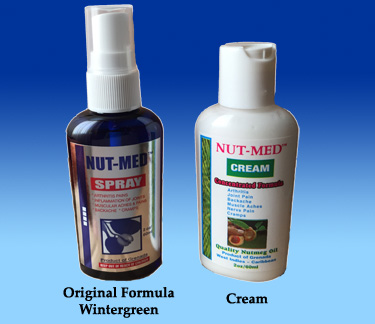
|
U.S., Canada, UK (England, Scotland, Wales & Northern Ireland), Ireland, Australia, and New Zealand
Please visit website for pricing. All orders shipped within 48hrs Mon-Fri (delivery by United States Postal Service). Please contact the U.S. Distributor for special prices on retail case orders in the U.S. and Canada
|
Austria, Germany and Switzerland Orders
Please visit website for pricing. |
All other Orders Please contact the manufacturer, Noelville Ltd.
by phone:
(473) 442-7514
(473) 409-7514
(Grenada - Intl charges apply)
by post:
PO Box 976, Grenville, Grenada, West Indies
|
The Nutmeg Story
Nutmeg: A Gift from Grenada
By Kate Heyhoe
Mention nutmeg and visions of eggnog, holiday baked goods, and white cream sauces, all sprinkled with a dash of this warmly aromatic spice, come to mind. But to understand the true versatility of nutmeg, ask a Grenadian.
Known as The Spice Island of the Caribbean, Grenada is famous for spice production and particularly for the production of nutmeg, with the nation producing a third of the world's supply. Nutmeg is found as a national emblem on the flag representing Grenada around the world, emphasizing its importance for the island. In Grenada nutmeg is King. Visitors to the island can't help but notice its scent on the balmy breeze and taste its rich flavor in a wide variety of Grenadian cuisine. Here, the fruit of the nutmeg is used to its full potential, with the yellow outer covering (called the pericarp) popping up in delicious jams, syrups and candies, and even in top-class liqueur.
The Nutmeg
The nutmeg tree grows to a height of 15 to 30 feet. There are three layers that surround the nutmeg fruit. The outer layer, known as the pericarp, is used to make nutmeg jelly. The red membrane, which enwraps the shiny dark nutmeg shell, is known as mace, nutmeg's twin spice, which is eventually dried and ground, and used in a variety of dishes. Inside this shell is a seed - the nutmeg. No part of the nutmeg is ever wasted including the shell, which is used as flower bed mulch and for covering garden plants.
The nutmeg fruit, when mature and still attached to the branch, splits open to expose the mace which is soft to the touch and even while drying, retains its powerful fragrance. The fruit ripens about five months after flowering. In the mountains, harvesting takes place throughout the year. Nutmegs are harvested after they fall to the ground. The mace is separated from the nutmeg, washed and put to dry and then taken to the processing station for grading. The nutmeg is left in its shell to air for two weeks, after which it is cracked open and the shell removed, ready for use.
More Than Just a Spice...
Four hundred years ago, nutmeg was the most valuable commodity in the world, owing to its potent medicinal properties. In 16th century London, for example, its price skyrocketed after doctors recommended it as a cure for the plague. The Asians used the seed of the nutmeg as an aphrodisiac, and by the 18th century, it made its way into snuff, which gentlemen removed from their silver snuff boxes for an after dinner snifter, while the women carried it in silver pendants around their necks as insurance against poor health.
Native to the Far East, its use in China dates back to the 5th century and was considered beneficial to the digestive system. It was one of several aromatics used in the streets of Rome during the coronation of Emperor Henry VI. It is now cultivated in the West Indies, Sri Lanka and Indonesia and is currently in the British Herbal Pharmacopoeia for rheumatism, nausea, diarrhea, flatulent dyspepsia and dysentery.Today, the medicinal uses of the nutmeg continue to be just as extensive as its culinary and therapeutic applications. The seed contains anti-fungal, anti-infectious and anti-bacterial agents as well as a volatile and non-volatile oil. The non-volatile oil can be found in pharmaceuticals, cosmetics, skin care products, insect repellants and aromatic candles and soap while the volatile oil is found in many sedative and antiseptic preparations and inhalants and chest rubs. Many arthritis sufferers use nutmeg oil and it has been used for years in the West Indies as a treatment for malaria, asthma and pneumonia.
History of Nutmeg in Grenada
Where did it all begin? Nutmeg first appeared in Grenada around the early 1800s when British spice traders brought it to the West Indies from the East Indies. This occurred in 1840, when inexperienced East Indies sugar planters ran into difficulties with their method of sugar extraction, they turned for help to the West Indies where a superior method was being used. When West Indies plantation owners went to the East Indies to assist, the story goes that they quietly pocketed some of the attractive smelling nutmeg seeds and then returned to Grenada and planted them in estate house kitchen gardens where the plants thrived.
Their action posed no threat to the Dutch East Indies nutmeg industry who jealously guarded their monopoly of nutmeg by dipping seeds for export into a lime solution to prevent germination. This monopoly was threatened in 1769, however, when the French sent Monsieur Poivre on a spice stealing expedition to the Dutch East Indies. He returned to the French colony of Mauritius with several hundred trees and thousands of seeds, but they didn't transplant successfully.
In 1850 a crop disaster in Indonesia prompted the commercial production of nutmeg in Grenada. After a leisurely start, the first 100,000 pounds were exported in 1881. By the early 1950s, production had reached a surplus. When Hurricane Janet swept through the island in 1955 destroying three quarters of the nutmeg trees, this surplus proved timely; the stored nutmegs kept Grenada on the map as a world producer.
Kate Heyhoe
The Global Gourmet
This article is for informational purposes and we do not endorse any health claims made by the author.
